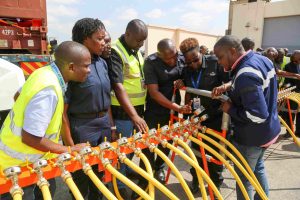
By;Joicy Wanjiru Mwangi,Wings to Fly (Alumni);
I am a graduate from the University of Eldoret having graduated in March 2021. Am currently doing small business in Kahawa West, Roysambu, Nairobi County. Equity Bank through the Equity Group Foundation offered me the Wings to Fly Scholarship through which I was able to go through high school and later join university where I pursued a bachelor’s degree in Food Operations Management.
COVID-19 has greatly affected the food systems. At farm level production has gone down due to limited resources or capital for farm inputs as resources in abundance have being shifted into managing or controlling the pandemic. Death of human beings due to the pandemic has reduced human capital and work force, as well as reduced activity due to the trauma accruing from the pandemic. Relatives and caretakers staying home to take care of individuals infected with the virus has also reduced human capital and effectiveness on farm activities. The above has also affected harvesting, storage and distribution of food. Of great impact to note, lockdown in counties and limitations on human mobility has greatly affected distribution and hence access to enough, safe and nutritious food to many, especially the marginalised and those living in dry and less productive lands. As a result of COVID-19, economy has hiked up, prices of almost all products and services are flared. Consequently, human financial capacity has gone down affecting affordability of food and hence low consumption and consumption of imbalanced diets. This also means that income for farmers and other food dealers has gone down.

As youths, we can help increase awareness and global education on the healthiest and most suitable options for both individuals and the environment. We are very active individuals and so we have many opportunities and platforms to engage in through which we can do sensitisation. The several ways include but not limited to, social media, campaigns, social gatherings, mass media, mentorship sessions, in schools and other institutions and even in family and religious settings. We can gain information from the internet interviews with professionals, personal knowledge and experience and even through questionnaires to assess situations, gain knowledge and later distribute the it through the various channels above mentioned.
Youths should be encouraged to take courses and career paths in agriculture. This will be the best way to gain knowledge on food systems and the possible and existing challenges, solutions and innovations to better the food systems hence enhance food security and sustainability. Agriculture been the highest income generating activity in Kenya and many other countries, it will also mean high chances of employment as well as self proprietorship that will allow youths towards self dependence and hence in the long run decrease the dependence ratio, an increase in per capita income, national economic growth and development, reduced rates of malnutrition, reduced crime rates among other benefits to individuals youths and the society.
There are many technological innovations that can be pushed to better food systems in Kenya and across the globe. These include but not limited to, natural food-to-food fortification, manufacture of soil PH-specific farm chemical, green house farming, irrigation farming, mechanical food harvesting, natural food preservation through solar drying, among others. Food biotechnology though facing many critics can be modified and made much safer for humans and the environment consumption and this will enhance food systems in Kenya and across the globe.








